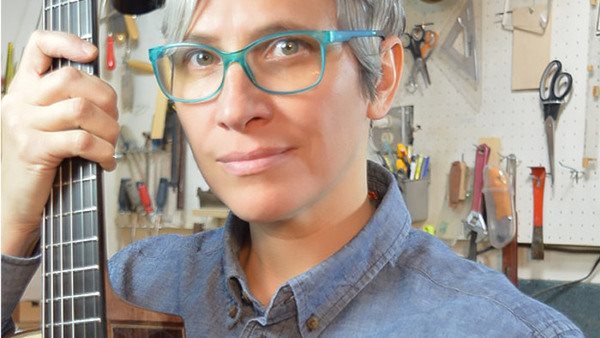
How did you become interested in lutherie?
"I was given a guitar by my parents when I graduated from high school. It was a modest guitar that I played a lot, but I immediately wanted more and better guitars than I could afford. A guitar teacher who was giving me lessons at the time offhandedly suggested I should learn to build guitars. I filed this thought away until a few months later when I looked up the options and learned that there was a course in guitar building in Vancouver, BC. I quit my job and moved to the West Coast where I started my journey learning to make musical instruments."
Have you experienced changes in the business climate for luthiers over time?
"Definitely. There have been peaks and valleys over the years largely related to macroeconomic conditions. It is hard to rationalize the purchase of an expensive hand-built instrument when one is feeling financially vulnerable."
What qualities would you say are good to have as a guitar builder?
"Some of the obvious qualities are attention to detail, the ability to solve problems, and some acuity as a woodworker. The more intangible elements are equally important but not as glamorous. Can you communicate with your clients? Do you listen to your clients? Can you manage the balance between the life of a craftsperson and the real day-to-day world? I also think a sense of humour is critical. Building guitars is a constant process of being humbled. When you’ve glued yourself to a fingerboard, bent a side backwards, or knocked a body off the bench onto the floor you have to learn to laugh at yourself and move on from these minor catastrophes."
Is there a difference in the view of hand-built guitars today compared to back in the day - in what way?
"I think there is a high standard to meet with today’s handmade guitars - the owners of these instruments are really well educated. Social media provides a constant feed of evolving, fascinating designs resulting in players with very high expectations for the fit, finish and tone of a bespoke piece. I still remember a time before email or DM was the main mode of communication and many of my commissions started with a good old-fashioned handwritten letter. At this time word of mouth was a critical way to connect with new clients and they had to make a greater effort to get in touch and commit to an instrument."
If you were to choose two work steps from the entire construction process, which steps do you think are the most fun?
"I love scraping down the binding on a guitar body. The instrument goes from a sloppy box covered in glue and tape residue to its crisply framed final look. The first coat of finish is also really satisfying when you finally get to see the wood come to life."
